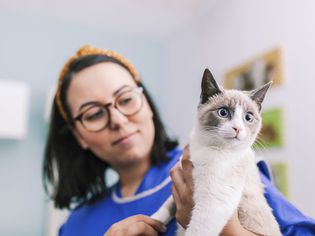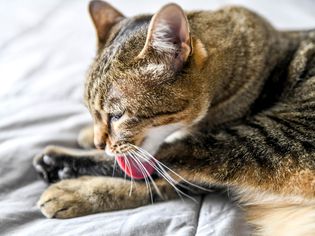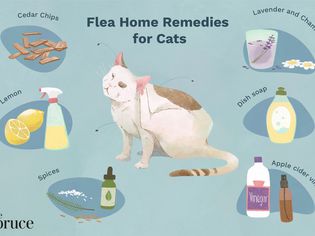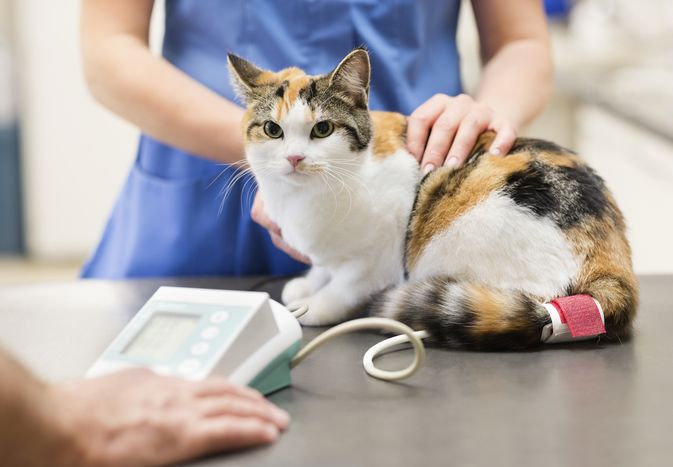Cats are one of the most popular household pet in the US, residing in about 25 percent of U.S. homes. However, while almost 83 percent of dog owners took their dog to the vet in a single year, only 54 percent of cat owners took their cat to the vet that same year. Do cats need veterinary care as often? How often should a cat even go to the vet? How often you should take your cat to the vet depends on their age as well as their general health status.
How Often Should Kittens Go to the Vet?
Kittens that are still nursing from their mom will gain antibodies for infectious agents in their mother’s milk. When the kittens are weaned off their mother’s milk, they no longer are able to get these needed antibodies to fight off infection. The weaning process begins at about 4 weeks of age and will continue until the kittens are fully weaned at around 10 weeks of age. This is why most veterinarians recommend that kittens begin their first round of vaccines at around 6 weeks of age.
Kittens are recommended to have 3-4 rounds of vaccines for FVRCP (Feline Viral Rhinotracheitis Calicivirus Panleukopenia, sometimes called feline distemper), 2 rounds of the FeLV vaccine (feline leukemia virus), and a rabies vaccine. The American Association of Feline Practitioners and the American Animal Hospital Association deems these three vaccines as core vaccines regardless of the cat's indoor/outdoor status.
Rabies vaccines are often mandated by local health departments as a requirement for all pet cats and are critical in protecting humans and animals from this fatal and untreatable disease. Cats are frequently involved in transmission of rabies and are the number one domestic animal carrier of rabies
It is believed that kittens vaccinated for FeLV, even if the vaccine is never given when the kitten matures into adulthood, will have a better chance of not succumbing to the virus if exposed later in life.
The FVRCP vaccine will protect a cat from several viral upper respiratory infections. It is also recommended for cats that have feline herpesvirus type 1, an illness caused by feline viral rhinotracheitis, because the vaccine may help to keep flare ups of the cat’s herpes symptoms to a minimum.
As stated, these should start around 6 weeks of age (no later than 8 weeks). Each vaccine booster should be given 3 to 4 weeks apart. Kittens can receive a rabies vaccine at around 12-16 weeks of age. After your kitten completes their kitten vaccines, they don’t necessarily need to be seen by the vet until they are old enough to be spayed or neutered or until they are a year of age and their vaccines come due again.
How Often Should Young Adult Cats Go to the Vet?
Young adult cats are between 1 and 6 years of age, according to the AAFP. These cats, generally, need to see the vet at least once a year. At 1 year of age, your cat will get their vaccine boosters as well as an overall checkup from your veterinarian.
Note that the AAFP recommends annual vet visits even if your cat isn’t due for a vaccine that year. This is to ensure your cat is properly assessed with a physical examination and any baseline diagnostics (bloodwork, urinalysis, etc.). Baseline lab work will give your cat’s veterinarian a baseline of what is "normal" for your cat if they ever become ill.
Oftentimes, your veterinarian may pick up on exam findings that you may not have noticed or realized as a health concern with your cat, including weight fluctuations, coat changes, body and muscle composition, dental health, skin tumors, ear infections, and many other issues that most cats hide or quietly suffer with.
Annual veterinary visits are also to ensure that there remains a valid doctor-patient-client relationship. This is especially necessary if your cat is on prescription medication or prescription food, so that your veterinarian can continue to legally provide ongoing care.
How Often Should Mature Adult Cats Go to the Vet?
Mature adult cats are defined as cats ranging from 7 to 10 years old by the AAFP. These cats should still see a vet at a minimum of an annual basis, but some veterinarians may recommend twice a year exams. As cats age, it’s important to get them properly assessed by your veterinarian to try and catch age-related illnesses and disease processes early. Cats are predatory animals, but they are also a prey species. As such, cats will often hide early illness, showing no clinical signs at home. Diagnostics such as bloodwork and urinalysis can help screen for heart disease, hyperthyroidism, kidney disease, diabetes, and other disease processes common in aging cats.
How Often Should Senior Cats Go to the Vet?
Senior cats are any cat 10 years and older. At this life stage, most veterinarians will recommend exams every 6 months. This is not just to try and catch any illnesses early but also to closely monitor a cat that may have been diagnosed with an illness.
Cats, especially indoor cats, may be at less of a risk for getting injured or contracting illnesses that are contagious between cats. This doesn’t mean they shouldn’t have regular vet visits, though. Your vet can ensure your cat is happy and healthy. They can also answer any questions you have about any age related illnesses that your cat may be predisposed to.










Comments on " How Often Should Your Cat Go to the Vet?" :